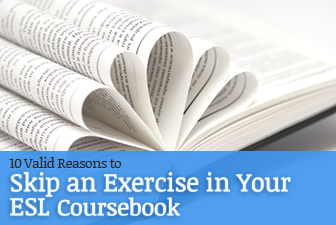What would ESL teachers do without the coursebook? It’s our very own GPS for guiding our students towards the ESL fluency they so desire. Or is it?
Could it possibly show us the wrong turn or lead us straight into a dead end?
While things may not be that dramatic with our trusty ol’ coursebook, it is true that coursebooks are not perfect; we may, on occasion, have to ignore what it says and choose to take another route instead. If you’re unsure about when it’s OK to skip exercises from your coursebook, here are some valid reasons to just go ahead and take that detour.

10 Reasons to Skip an Exercise (or Two) in Your ESL Coursebook
-
1
It’s too easy
Coursebooks are written to suit a range of students who fall into a particular level (beginner, intermediate, etc.) But we may sometimes find that a particular exercise is not challenging enough for your group of students.
If it’s an exercise that lists verbs and requires students to write the verb in Simple Past, by all means skip it and replace it with something that is a bit more productive. For example, have students ask each other questions in the past with “did”, which would then require them to answer by using the verb correctly in its past form. This way, students practice longer more complete answers and use the verbs in context.
-
2
It’s too hard
By the same token, there may be an exercise that is simply too difficult and may eventually lead them to lose confidence. You may choose to give them a simpler version of this complicated time-waster.
-
3
It has complicated instructions
Some exercises provide directions that are not at all clear – sometimes even you don’t get it! It may require a complex series of steps or use words students don’t understand. There is no reason to subject them to something that will only end up frustrating them. Nor is it reasonable for you to waste time trying to figure it out. If the goal is to practice modal verbs, just give them an acceptable equivalent to practice exactly that.
-
4
It’s plagued with mistakes
Guess what? Coursebook writers are human! They make mistakes, too. If you find an exercise that has several mistakes, inconsistencies or inaccurately explains a grammar point, don’t use it.
-
5
It’s too repetitive
One of the best ways to keep students engaged is to give them variety. If they’ve already done a particular type of exercise, for example a True or False, this week, why not change it for another type like a Multiple Choice exercise? Or just skip the T/F and ask them your own questions to check for comprehension.
-
6
It’s not part of the course syllabus
Sometimes you come across a grammar point you’re not supposed to teach for that level, or perhaps you’ll be teaching it later. If it’s not in your syllabus for that course, skip it.
-
7
It’s better suited for homework
Some exercises are too long and require students to work quietly for an extended period of time. If you’d rather do something that’s a bit more fun and engaging, simply assign it for homework.
-
8
Students hate it!
This is one of the advantages of having previously used a coursebook with another class – you know what works and what doesn’t. Skip exercises you know students did not like or were bored doing. This goes especially for speaking tasks or discussion points that usually fail to get the conversation going.
-
9
You’re out of time!
If you’re running out of time and still have one last exercise to finish the unit, replace it with a 5-minute cool down.
-
q
It’s outdated
Sometimes coursebooks include facts or information that is seriously outdated. This is particularly the case when it comes to technology. Replace the reading or exercise with another that includes more recent, updated information.
The coursebook is the backbone of your course; it lends support and structure to your classes, and helps students monitor their progress. However, some students do rely much too heavily on “the book”.
What do you do if a student calls you out on the fact that you’re skipping exercises? It’s simple. Review his or her language goals and tell your student that your priority is to help them achieve these goals. If you choose to skip or replace exercises, it is because you deem it best.
Sometimes we all need a little course correction. If you take a detour and give your students a route that is more scenic than the one proposed by the book, they will probably thank you for it.
What is your experience with coursebooks? Do you often skip exercises? Have you ever encountered a problem with a book? Would love it if you shared your thoughts!
P.S. If you enjoyed this article, please help spread it by clicking one of those sharing buttons below. And if you are interested in more, you should follow our Facebook page where we share more about creative, non-boring ways to teach English.







